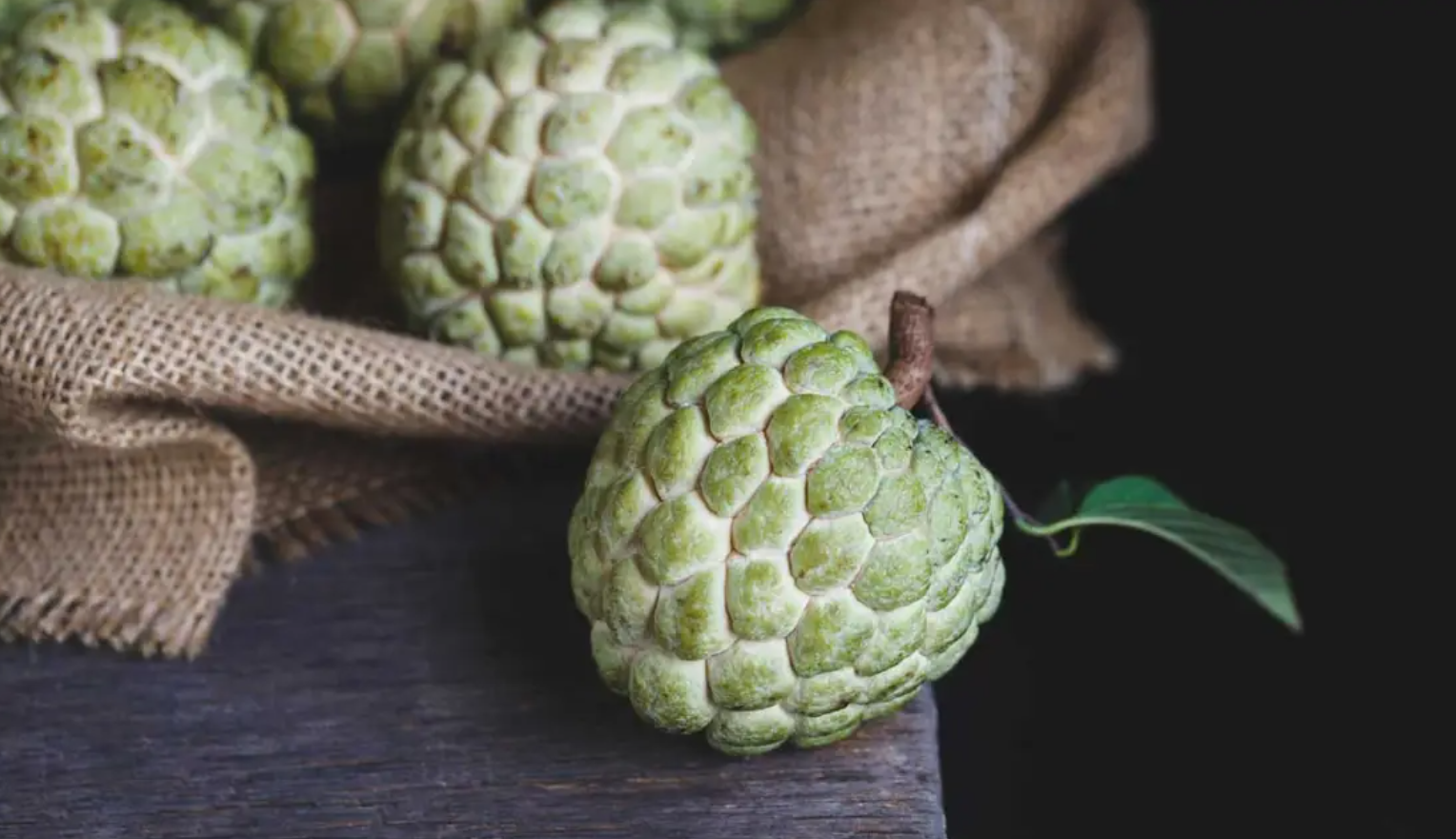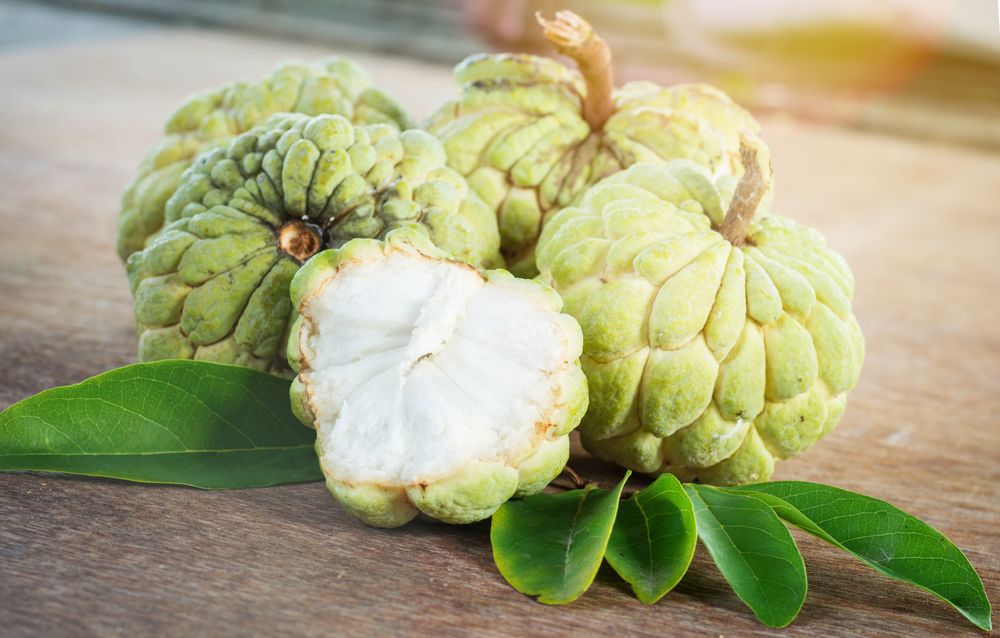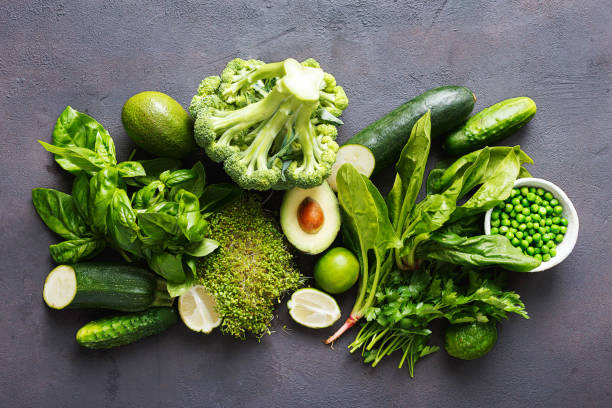Surprising Health Benefits Of Custard Apples

Custard apple is a tropical fruit with sweet, creamy flesh and a custard-like texture. It is also known as cherimoya, sugar apple, or soursop in different parts of the world. Custard apple is delicious but also nutritious and beneficial for your health.
In this blog, I will share with you some of the fantastic benefits of custard apple, such as its antioxidant, anti-inflammatory, mood-boosting, eye-protecting, heart-supporting, digestion-improving, bone-strengthening, brain-enhancing, and anti-cancer properties.
Custard Apple Benefits :
Custard apple is a delicious and nutritious fruit that has many health benefits. Here are some reasons you should include custard apples in your diet.
It is rich in antioxidants
Custard apple is loaded with antioxidants, compounds that protect your cells from damage caused by free radicals. Free radicals are unstable molecules that can cause oxidative stress, linked to many chronic diseases like cancer and heart disease.
Custard apple contains various antioxidants, such as vitamin C, kaurenoic acid, flavonoids, and carotenoids. These antioxidants can help prevent or reduce inflammation, boost your immune system, and protect your skin from ageing and sun damage.
It may boost your mood
Custard apple is an excellent source of vitamin B6, also known as pyridoxine. This vitamin is essential for producing neurotransmitters, which are chemical messengers that regulate your mood and emotions.
Some neurotransmitters that depend on vitamin B6 are serotonin and dopamine, which are associated with happiness and pleasure.
Low levels of vitamin B6 can lead to depression, especially in older adults. By eating foods like custard apples, you can increase your intake of vitamin B6 and improve your mood.

It may benefit your eye health
Custard apple is rich in the carotenoid antioxidant lutein, the main antioxidant in your eyes. Lutein helps to maintain healthy vision by fighting free radicals and filtering harmful blue light from the sun and digital devices.
Studies have shown that a high intake of lutein can lower the risk of age-related macular degeneration (AMD), which is a condition that causes vision loss in older adults. Lutein may also protect against cataracts, a clouding of the eye’s lens that impairs eyesight.
It may support your heart health
Custard apple may help keep your heart healthy by regulating blood pressure and cholesterol levels. The fruit contains magnesium, a mineral that helps relax the smooth muscles of your heart and blood vessels.
This can prevent high blood pressure, stroke, and heart attack. Custard apple also has fibre, which can lower the bad cholesterol (LDL) and raise the good cholesterol (HDL) in your blood. High LDL and low HDL are risk factors for heart disease.
It may aid digestion and prevent constipation
Custard apple is high in fibre, improving your digestive health by adding bulk to your stool and making it easier to pass. This can prevent or relieve constipation, a common problem affecting many people.
If left untreated, constipation can cause discomfort, bloating, gas, and other complications. Custard apple can also help detoxify your body by removing waste and toxins from your intestines.
It may enhance your bone health
Custard apple contains calcium, phosphorus, and magnesium, which are minerals that are important for your bone health. Calcium and phosphorus are the main components of your bones and teeth, while magnesium helps regulate calcium absorption and metabolism.
Adequate intake of these minerals can prevent or delay osteoporosis, which is a condition that causes bone loss and fractures in older adults.
It may boost your brain function
Custard apple may help improve your brain function by providing glucose and potassium. Glucose is the main energy source for your brain cells, while potassium is an electrolyte that helps maintain the electrical activity of your neurons.
Custard apple can provide enough glucose and potassium to keep your brain alert and focused. Custard apples may also protect your brain from oxidative stress and inflammation, which can impair your memory and cognition.
It may have anti-cancer properties
Custard apples may have potential anti-cancer effects due to their antioxidant and anti-inflammatory compounds. Some studies have shown that custard apple extracts can inhibit the growth and spread of various cancer cells, such as breast, colon, lung, liver, prostate, and skin cancer.
However, more research is needed to confirm the effectiveness and safety of custard apples as a natural cancer treatment.
Read More – What Is Metabolic Confusion? How Does It Work?
Conclusion
Custard apple is a tasty and healthy fruit that benefits your overall well-being. It is rich in antioxidants, vitamins, minerals, and fibre, supporting your immunity, mood, eye health, heart health, digestion, bone health, brain function, and cancer prevention.
You can enjoy custard apple as fresh fruit or use it to make smoothies, shakes, ice cream, and other desserts. However, be careful not to eat the seeds of custard apples, as they contain toxins that can harm your nervous system if consumed in large amounts.
FAQs:
What is a custard apple?
A custard apple, also known as “sugar apple” or “cherimoya,” is a tropical fruit with a creamy, custard-like texture and a sweet flavour. It belongs to the Annonaceae family of flowering plants.
What does a custard apple look like?
Custard apples are typically green in colour with scaly or bumpy outer skin. They are usually heart-shaped or oval and can vary in size from a few inches to around 6 inches in diameter.
Is custard apple nutritionally beneficial?
Yes, custard apples are a good dietary fibre, vitamin C, vitamin B6, and potassium source. They are also low in fat and cholesterol, making them a healthy choice in a balanced diet.
Can custard apples be used in cooking?
Yes, custard apples can be used in various culinary creations. They are often enjoyed fresh but can also be used to make desserts, smoothies, milkshakes, ice creams, and even incorporated into salads.
Are custard apples grown globally?
Custard apples are predominantly grown in tropical and subtropical regions around the world. They are commonly found in India, Australia, the Philippines, and South America.





